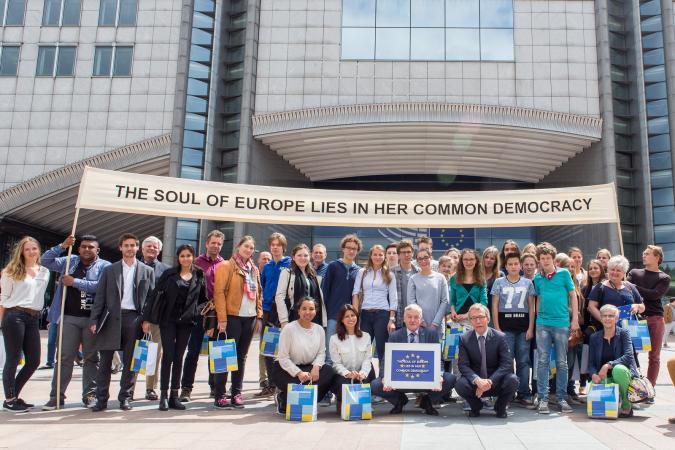In the midst of the crisis concerning the place of Greece in the Economic and Monetary Union (EMU) and the European Union (EU), the European Council will discuss a report on better economic governance in the Euro Area. As the 'analytical note' has been drafted by the Presidents of the European Commission, the Council, the Euro Group and the ECB, the report is referred to in inner circles as the Four Presidents' Report.
Guest blog by Jaap Hoeksma, Philosopher of Law, Director of Euroknow and Creator of the Boardgame Eurocracy
In the midst of the crisis concerning the place of Greece in the Economic and Monetary Union (EMU) and the European Union (EU), the European Council will discuss a report on better economic governance in the Euro Area. As the 'analytical note' has been drafted by the Presidents of the European Commission, the Council, the Euro Group and the ECB, the report is referred to in inner circles as the Four Presidents' Report.
The first paragraph of the note is devoted to a reflection on the nature of the EMU. The presidents suggest that the euro is more than a currency and that the EMU is also a political project. In their view, the euro has created a 'community of destiny' between the 19 member states that share the euro as their currency; this requires both solidarity in times of crises and respect by all for commonly agreed rules. While the British government is likely to argue that this community of destiny is exactly why the UK will not become part of the euro zone, the question for the present EMU member states is whether it provides sufficient democratic legitimacy for their single currency.
From a philosophical point of view, it seems obvious that it is not possible to discuss the nature of the EMU in a meaningful way without addressing the question as to what the EU essentially is. In other words, a discussion about the nature of the EMU presupposes a discussion about the nature of the EU proper. Until recently, the exchanges of view between the supporters of a sovereign state of Europe and the advocates of a Europe of sovereign states ended in deadlock. The Lisbon Treaty has superseded this debate by establishing beyond doubt that the present EU is neither a state nor a union of states. The EU is not a sovereign state because sovereignty in the Union rests with the member states; the EU is not a union of states because it also has citizens, a directly elected parliament and an independent court.
The novelty of the 2007 Lisbon Treaty is that it construes the EU as a democracy without turning the Union into a state. In the same vein, the euro has been introduced as a currency beyond the state. The EU may therefore be described as a new kind of international organisation with a distinct form of democracy and a single currency. It follows that the EU and the EMU should not be analysed in isolation but rather in mutual interdependence.
These distinctive qualities of the EU and the EMU originate from a different approach to the concept of sovereignty. In deviation from the prevailing theory of international relations, which underlies the organisation of the United Nations, the process of European integration is based on the premise that sovereignty can be applied in a flexible manner. In practice, the EU shows that it is feasible for democratic states to share the exercise of sovereignty without losing statehood. Similarly, the EMU proves that states can enjoy the benefits of a single currency without having to merge into a federal state.
Seen from a citizens' perspective, it seems to be self-evident that, if two or more democratic states decide to share the exercise of sovereignty in a number of fields with a view to attain common goals, the organisation they establish for this purpose should be democratic too. In this perception EU citizens are not only entitled to participate in the national democracies of their countries, but also in the common democracy of the Union.
In hindsight, it is not difficult to criticise previous political leaders for the light-hearted, if not irresponsible manner in which they created the single currency. For reasons of fairness, it should also be recalled that, at the time of the 1992 Maastricht Treaty, the introduction of the euro was regarded as the crown on the common market. During the financial crisis, however, the frailties of the EMU were exposed in such a harsh manner that the euro almost collapsed. In line with their -by now- established approach to the concept of sovereignty, the member states proved to be willing to pool sufficient sovereignty in order to save the euro. In doing so, they established themselves as the joint sovereign behind the euro.
As President of the European Commission, Jacques Delors used to emphasize that Europe needs a soul. L'Europe a besoin d'une âme. A quarter of a century onwards, it has been suggested that the soul of Europe lies in her common democracy. In terms of political theory, this vision implies that, as a European polity of citizens and member states, the EU derives its legitimacy both from its states and its parliament. Although the democratic character of the Union is in urgent need of improvement, this construction provides the framework, within which the euro can enjoy democratic legitimacy.
